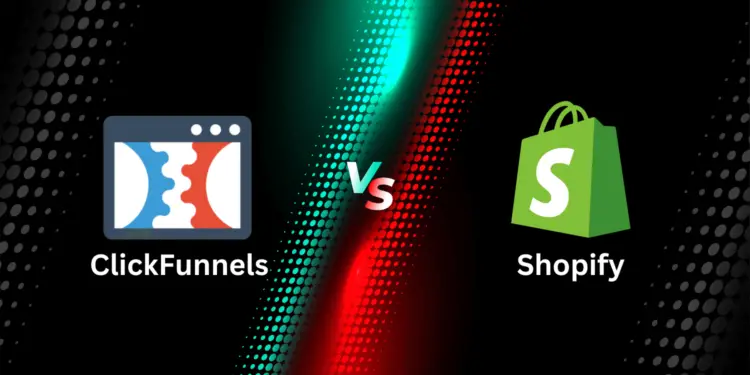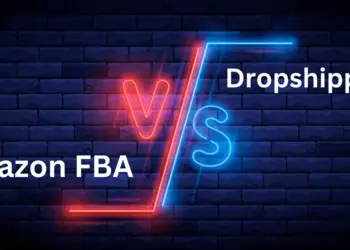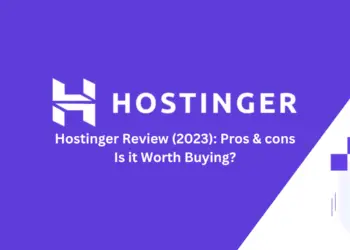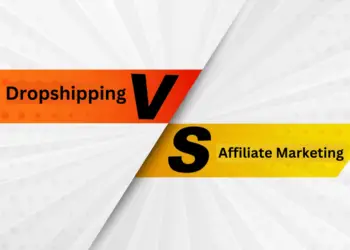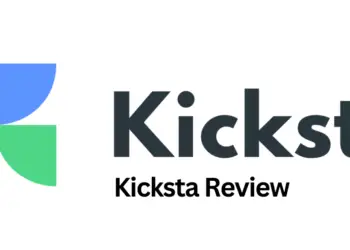Clickfunnels vs Shopify: Congratulations on taking the brave step of launching your business online! As you embark on this journey, one of the crucial decisions you’ll need to make is choosing the right eCommerce platform to sell your products. With two heavyweights in the industry, Clickfunnels and Shopify, it can be challenging to determine which one is best for your business.
You’ve probably stumbled upon both Clickfunnels and Shopify during your online research, but the truth is, neither platform is a one-size-fits-all solution. Each has its strengths and weaknesses, and the choice you make will depend on the type of business you’re running and the products you’re selling.
To help you make an informed decision, this review will compare Clickfunnels and Shopify in several critical aspects. By the end of this article, you’ll have a clear understanding of which platform is the right fit for your business. So let’s dive right in!
- ClickFunnels vs Shopify Overview
- ClickFunnels vs Shopify: Pros and Cons
- Comparing Clickfunnels vs Shopify pricing
- Clickfunnels vs Shopify Features comparison
- Clickfunnels vs. Shopify: Which is the Better E-commerce Platform?
- Features: Which platform is more effective?
- Pricing: Which platform offers better value?
- Which eCommerce Solution is Better for Tracking Your Business?
- Mobile App Availability: Which Solution is Better?
- Affiliate Program Management: Which Solution is Better?
- Single Page Product Display: Which Solution is Better?
- Blogging Functionality: Which Solution is Better?
- Final Words: Which eCommerce Solution is Right for You?
ClickFunnels vs Shopify Overview
If you’re looking to start an online store, Shopify and ClickFunnels are two great options to consider. Here’s what you need to know to make the right choice.
Shopify
Shopify is an excellent choice for those who want to create a professional-looking online store quickly and easily. With a wide range of themes tailored to different niches and industries, you can customize your store to fit your brand’s unique style.
Shopify also offers an inventory management system, which allows you to keep track of your physical products easily. And with seamless payment integration and exclusive shipping rates for popular carriers like DHL, UPS, and USPS, you can offer a smooth customer experience.
The best part? You don’t need to have any coding experience to get started with Shopify. Its built-in templates and extensive developer community mean that you can set up your store in no time and get help with any technical or non-technical issues along the way. Plus, Shopify’s App Store is full of plugins and integrations to enhance your store’s functionality.
ClickFunnels
If you’re new to selling products or services online, ClickFunnels can help you get started quickly and easily. It’s a powerful software that offers high-performance converting sales funnels, specifically designed to sell goods, memberships, ebooks, classes, webinars, and more.
Not only does ClickFunnels help you sell products, but it also allows you to create an email list and run automated email marketing campaigns. This means you can build relationships with your customers and turn them into repeat buyers.
So, Which One Should You Use?
Ultimately, the choice between ClickFunnels vs Shopify depends on your specific needs. If you’re looking to build a professional online store with ease, Shopify is the way to go. But if you want to sell your first product quickly and easily, or need to build a high-converting sales funnel, ClickFunnels may be the better choice.
ClickFunnels vs Shopify: Pros and Cons
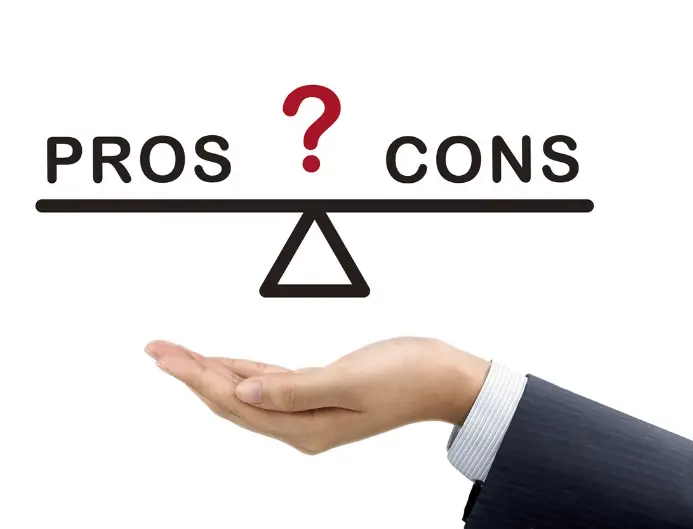
If you’re trying to decide between ClickFunnels and Shopify, it’s important to weigh the pros and cons of each platform. Here’s what you need to know:
ClickFunnels Pros:
Building a funnel is quick and easy, with pre-built funnels optimized for high conversion rates.
You don’t need any prior marketing experience to succeed with ClickFunnels.
All the tools you need for your ClickFunnels business are included, so you don’t have to pay for external services.
ClickFunnels Cons:
Plans are more expensive than Shopify’s.
It’s mainly designed for single or limited batches of products, not a full eCommerce shop.
You can’t use it on mobile devices, as there’s no mobile app available.
Shopify Pros:
You can sell an unlimited number of items at once.
Shipping rates are low, thanks to Shopify’s distribution partners.
You can manage your business on the go, thanks to the Shopify mobile app.
Shopify Cons:
While Shopify offers payment processing, you’re responsible for your own marketing efforts.
Integrating with other companies can increase your business costs.
Setting up a store takes time and effort, and you need to have technical knowledge of marketing.
Ultimately, the choice between ClickFunnels and Shopify depends on your specific needs and goals. Consider the pros and cons carefully to make the right choice for your business.
Comparing Clickfunnels vs Shopify pricing
If you’re considering using Clickfunnels or Shopify, pricing is an important factor to consider. Here’s a breakdown of the pricing plans offered by both platforms.
Clickfunnels Pricing
Clickfunnels offers two main pricing plans. The Standard Plan costs $147 per month and provides access to Clickpops, ClickOptin, funnels, email integrations, and SMTP integration, among other features. The Etison Suite plan, on the other hand, costs $297 per month and provides unlimited access to everything Clickfunnels has to offer, including a built-in autoresponder and affiliate marketing management tool.
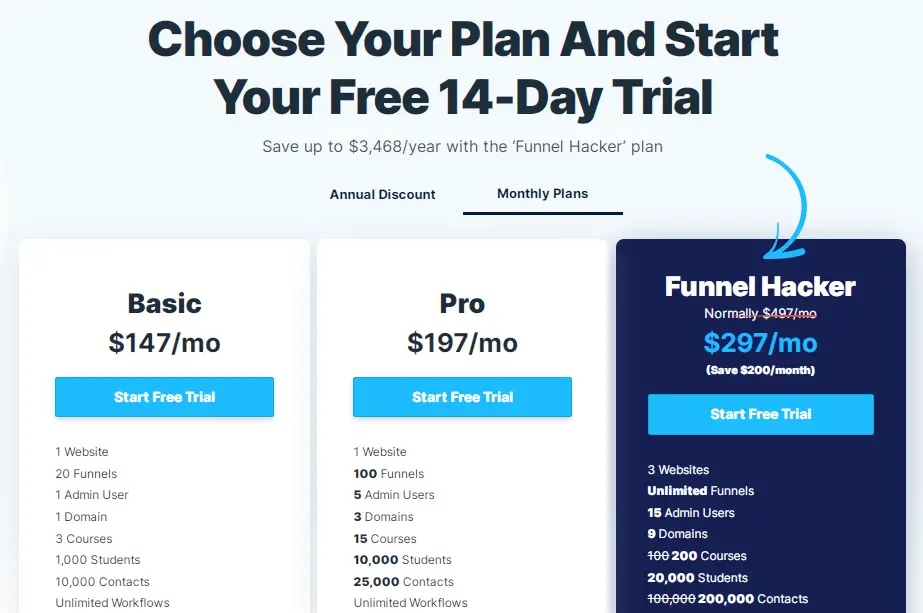
In addition to these plans, Clickfunnels also offers a discounted Funnel Builder Secrets option that provides everything you need to master funnel building.
Shopify Pricing
Shopify offers a 14-day free trial period and a range of pricing plans to choose from, depending on your business needs. Here are the prices of Shopify’s three main plans:
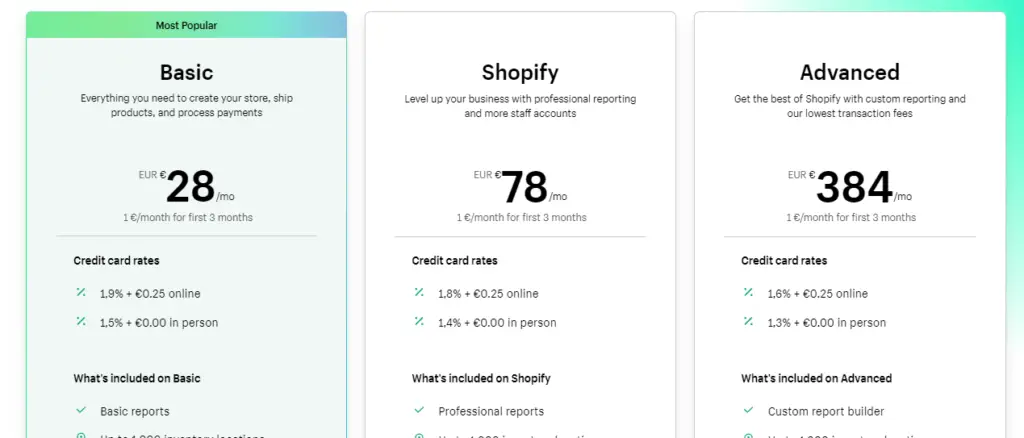
Basic Plan: €28 per month – includes a variety of themes, integration with PayPal, SEO features, the ability to connect over 100 payment gateways, and more.
Shopify Plan: €78 per month – includes everything in the Basic Plan, as well as lower transaction costs for third-party applications, professional reporting, and complete point of sale functionality.
Advanced Plan: €384 per month – includes all the features of the Shopify Plan, plus more flexibility to take your business to the next level. You’ll have access to the Advanced Report Builder to generate custom reports, as well as real-time shipping carrier rates.
Shopify also offers a 10% discount on an annual subscription and a 20% discount on a biennial contract if you prefer not to go with a monthly plan.
In conclusion, Clickfunnels is a bit pricier than Shopify, but it provides more funnel-building features. Shopify, on the other hand, offers more comprehensive eCommerce features for selling unlimited products. It’s important to consider your business needs when choosing between the two.
Clickfunnels vs Shopify Features comparison
ClickFunnels Features
Looking for a user-friendly yet powerful platform to set up your online store and marketing funnel? Look no further than ClickFunnels. This platform offers a range of features that are ideal for both beginners and experienced marketers.
- Ready-made Sales Funnels: With ClickFunnels, you can access a variety of ready-made sales funnels for physical and digital products. These templates include opt-in, sales, check-out, and thank-you pages that you can easily customize to suit your needs.
- Website Building Tool: If you prefer to create your own sales funnel from scratch, ClickFunnels’ website building tool has got you covered. You can design your own pages with opt-in forms, checkout carts, payment integrations, and more. This feature is best for advanced users, but beginners can still access ready-made templates.
- Payment Integrations: ClickFunnels integrates with popular payment processors such as PayPal, EasyPayDirect, and Stripe, allowing you to manage your revenue effectively by receiving payments from one central point.
- Customer Relationship Management (CRM) System: As a data-driven platform, ClickFunnels provides access to consumer data that helps you tailor your marketing strategies to different customer types. You can view information such as social media activity, spending habits, preferences, and geographic location.
- Action Funnels: With ClickFunnels’ action funnels, you can combine your sales acquisitions with email campaigns to create an integrated marketing plan. You can set up the If This Then That (IFTTT) feature to trigger specific actions based on user behavior, such as adding customers to your mailing list or sending thank-you emails.
- Affiliate Marketing System: ClickFunnels helps you set up affiliate marketing programs, allowing others to earn commissions from converted leads they generate. This feature can help you increase your profits by turning everyone into a potential brand advocate.
- Email Marketing Tool: Marketing is a critical aspect of any business, and ClickFunnels provides an email marketing tool to help you deliver personalized campaigns to different types of customers.
In summary, ClickFunnels offers a range of features that cater to both beginners and experts. Whether you want to use ready-made templates or build your own sales funnel from scratch, this platform has got you covered. With its powerful CRM, action funnels, and email marketing tools, ClickFunnels is an all-in-one solution for your marketing needs.
Features of Shopify
Are you looking for a powerful eCommerce platform that is perfect for seasoned business people with extensive knowledge of different marketing tools? Look no further than Shopify. With Shopify, you can easily build a successful online store that caters to your unique business needs. Here are some of the best features that Shopify has to offer:
- Online Store Builder: With Shopify, you have access to a wide range of themes that you can use to design your online shop. You can customize every theme feature to build a website that reflects your brand’s personality. Plus, your website on Shopify is guaranteed to be mobile-responsive. You can also use its content management system to build blog posts and other engaging content to drive traffic to your site.
- Analytics Dashboard: Shopify offers Google Analytics integration to help you track the success of various aspects of your business. This feature can be extremely useful when making business decisions. You can see how each product performs and manage your inventory more effectively.
- Customer Management System: Like ClickFunnels, Shopify lets you provide accurate details about your customers so that you can tailor your products to their needs. You can allow your customers to shop as a guest or create an account to become a regular customer. Shopify makes it easy to handle refunds and categorize your customers into different groups.
- Inventory Management System: As a business owner, it’s crucial to have an up-to-date inventory. Shopify’s Inventory Management System makes this easy. After adding a product and making various versions of it, Shopify can automatically monitor sales so that you know when to restock.
- Payment Integration: Shopify is compatible with Visa, Mastercard, PayPal, and a range of other payment options. It also handles the tax element of your business. You can offer free shipping and discount codes to customers, and Shopify works with major couriers to offer low shipping rates. Plus, Shopify works with Oberlo for businesses who want to drop ship without storing their own inventory.
- Social Media Sales Channels: With Shopify, your customers can purchase from you via social media sites like Facebook, Pinterest, eBay, Amazon, and others. You can easily integrate your store with these platforms and set up a shop inside them.
- App Store: Shopify offers a wide range of apps and plugins in its app store. You can use them to create landing pages, opt-in forms, and engage in email marketing campaigns, among other useful features.
- Mobile App: Shopify has a mobile app for both Android and iOS devices so that you can run your business even while you’re on the move.
- Professional Themes: Shopify offers a wide range of templates and themes that you can use to set up your eCommerce shop. Some of these themes are free, while others have a price. You can customize any pre-designed template to look the way you want without any coding experience. Shopify templates are known for their beauty and responsiveness to mobile devices, making it easy for your current and prospective customers to shop on your site.
In conclusion, Shopify is the ideal platform for seasoned business people who want to take their online business to the next level. With its wide range of features, you can easily customize your online store, manage your inventory, and integrate your store with social media sites and other eCommerce tools. Start your Shopify journey today and experience the power of eCommerce.
Clickfunnels vs. Shopify: Which is the Better E-commerce Platform?

Are you torn between Clickfunnels and Shopify and wondering which one is right for your online business? Let’s compare these two platforms and see which one comes out on top.
Features: Which platform is more effective?
Both Clickfunnels and Shopify are great options for beginners who are just starting out in the world of e-commerce. They offer a wide range of features that can help you learn the ropes of online business. However, ClickFunnels has a slight edge in this area. This is because it provides users with video guides and training materials to improve their drop-shipping skills and master the platform.
Clickfunnels also boasts a strong support network, membership tool, CRM app, and automation tool that make running an e-commerce business easier. On the other hand, if you’re a seasoned digital marketer, Shopify may be the better choice. It gives you greater control over your online business and has superior product management and distribution capabilities.
Pricing: Which platform offers better value?
Regardless of whether you’re a newbie or an experienced online business owner, pricing is a key factor to consider. In the Clickfunnels vs. Shopify debate, pricing can be a little tricky to compare.
The good news is that the most popular plans for both platforms are similar in price, at €384 per month for Shopify and $297 per month for ClickFunnels. However, there is a significant difference in the pricing of their cheapest plans, with Shopify starting at €28 per month and ClickFunnels at $147 per month.
Another important factor to consider is the quality of third-party applications. ClickFunnels provides all the essential features you need for your sales funnels, so you don’t have to purchase any additional third-party apps for e-commerce, drop-shipping, or affiliate marketing. Shopify, on the other hand, often requires third-party apps to increase the profitability of your business, which can be costly.
Overall, ClickFunnels appears to offer more competitive pricing and value for money compared to Shopify.
Read also:
- Social Media Marketing in 2023: The Complete Guide for Businesses
- 7 Profitable Niches to Work on Fiverr
Which eCommerce Solution is Better for Tracking Your Business?
When it comes to tracking your eCommerce business, both Shopify and ClickFunnels offer tools to manage your finances, clients, marketing, and other aspects of your business. However, ClickFunnels goes beyond the basics by providing advanced automation features that allow you to track customer transactions and their other actions. This is not something Shopify offers right out of the box.
Moreover, ClickFunnels has built-in features specifically designed for building sales funnels and capturing more leads for your eCommerce store. Shopify lacks this functionality, and you would need to find other resources to learn how to drive traffic and bring customers back to your store. ClickFunnels educates you on these aspects so that you can get the most out of your eCommerce.
Mobile App Availability: Which Solution is Better?
Shopify takes the lead in this category as it offers both Android and iOS apps that allow users to monitor their sales and manage their business from anywhere. Unfortunately, ClickFunnels does not provide mobile apps, and you need to be on a computer to manage your sales.
Affiliate Program Management: Which Solution is Better?
ClickFunnels has a clear system to track affiliate marketing programs and create a member area, which is not available on Shopify. If you plan to operate an affiliate marketing scheme, Shopify may not be the best option for you.
Single Page Product Display: Which Solution is Better?
With Shopify, you can list and sell a variety of products in different categories, making it ideal for sellers who want to offer different goods. On the other hand, ClickFunnels is at a slight disadvantage in this matter. If you are already using your funnel or product page, ClickFunnels does not allow you to display or sell other related products on the same page, which could be a big problem for sellers who want to list multiple similar products on one page.
Blogging Functionality: Which Solution is Better?
If you want to promote your blog post products, Shopify’s blogging functionality can help you achieve this. This easy-to-use blogging platform is perfect for driving traffic to your eCommerce store. ClickFunnels lacks this feature, but it compensates with other features that can generate traffic and leads to your shop.
In conclusion, both Shopify and ClickFunnels offer unique features for tracking your eCommerce business. While Shopify provides more flexibility in terms of product display and mobile app availability, ClickFunnels stands out in advanced automation, sales funnel creation, and affiliate program management. Ultimately, the choice between the two platforms depends on your specific business needs and goals.
Final Words: Which eCommerce Solution is Right for You?
In conclusion, when comparing ClickFunnels and Shopify, it’s important to note that while they have similarities in terms of pricing, benefits, and features, there are key differences that make each one unique. Both platforms have proven to be reliable and effective in helping customers take their eCommerce business to the next level.
However, there’s no need to choose between the two as you can combine the full delivery, payment, and inventory benefits of Shopify with the powerful lead generation and conversion features of ClickFunnels. This way, you can get the best of both worlds.
Ultimately, the decision of which eCommerce solution to use is up to you. We hope this article has provided you with valuable insights into how Shopify and ClickFunnels work and how they differ from one another. With this knowledge, you can make an informed choice and start building your dream eCommerce business.

